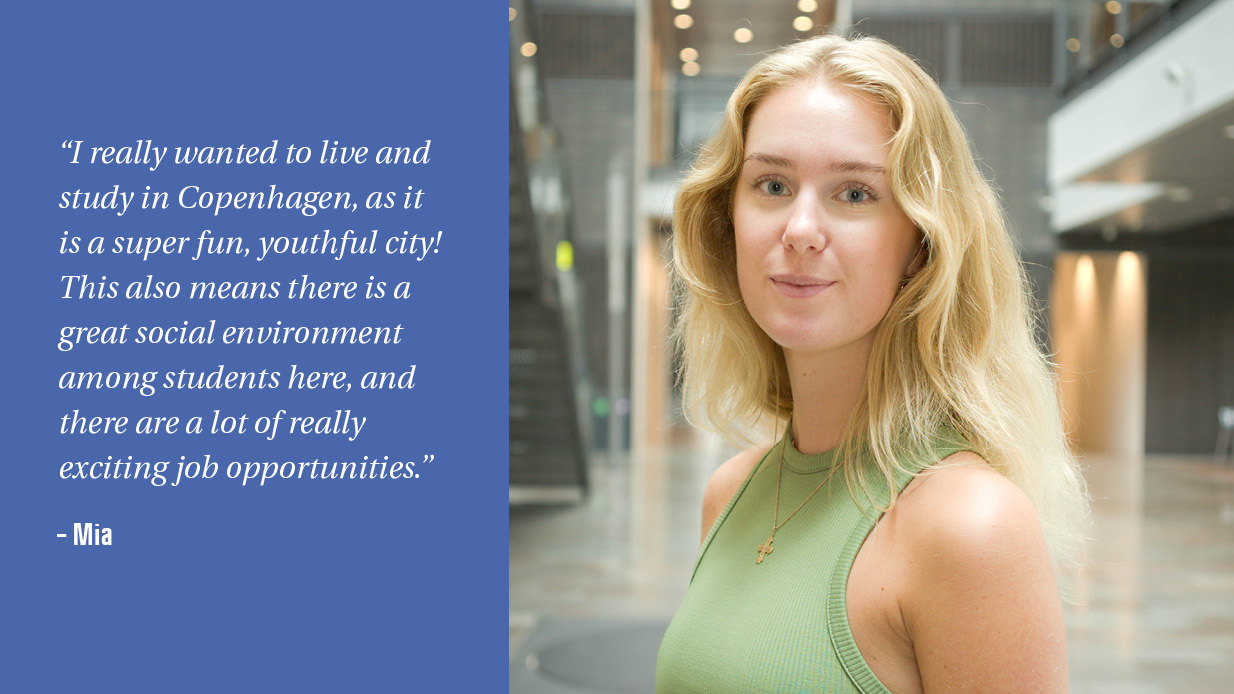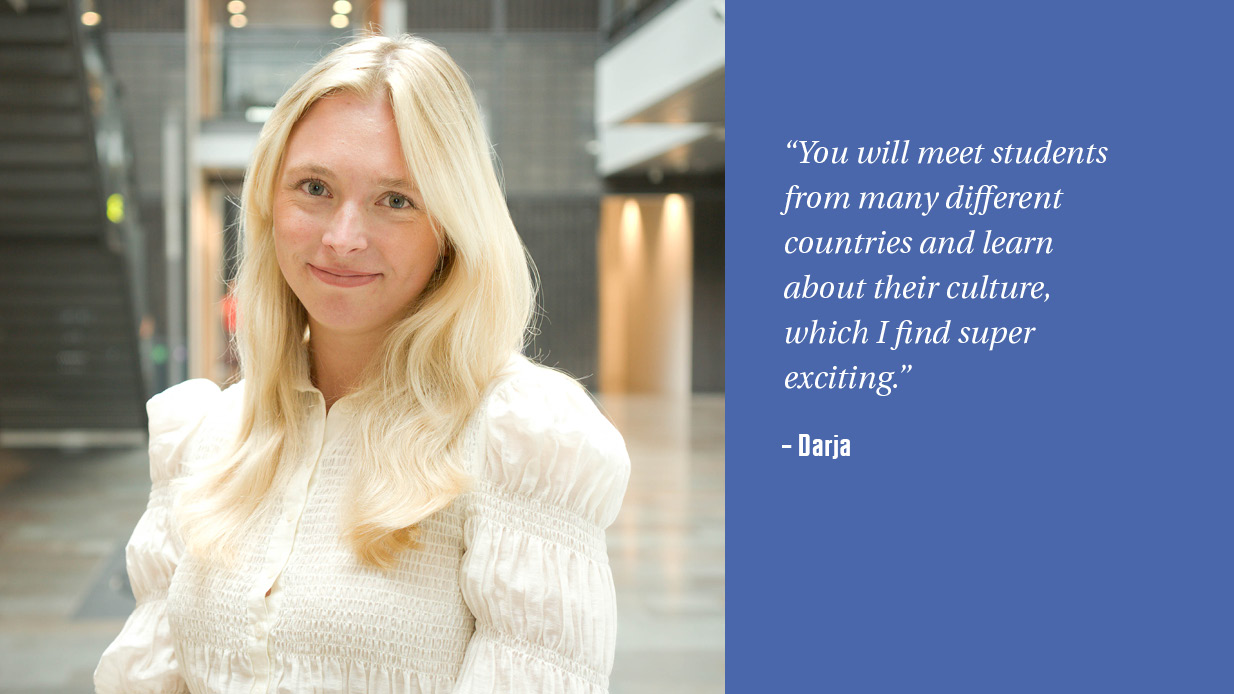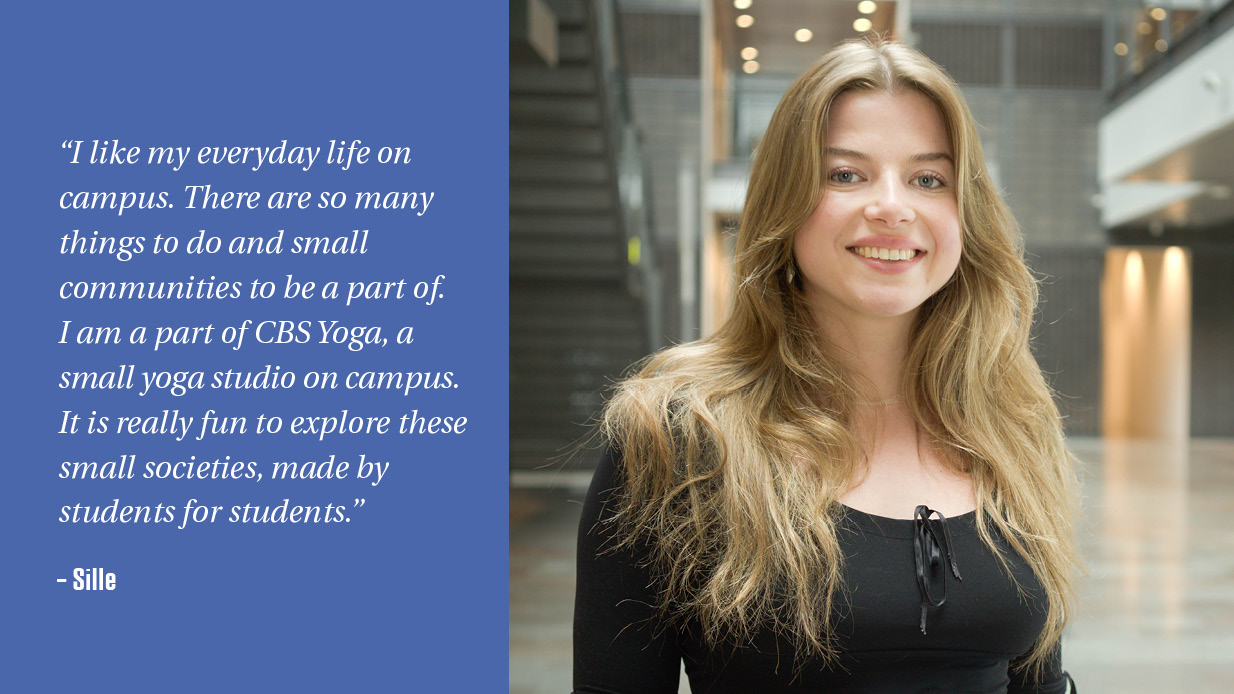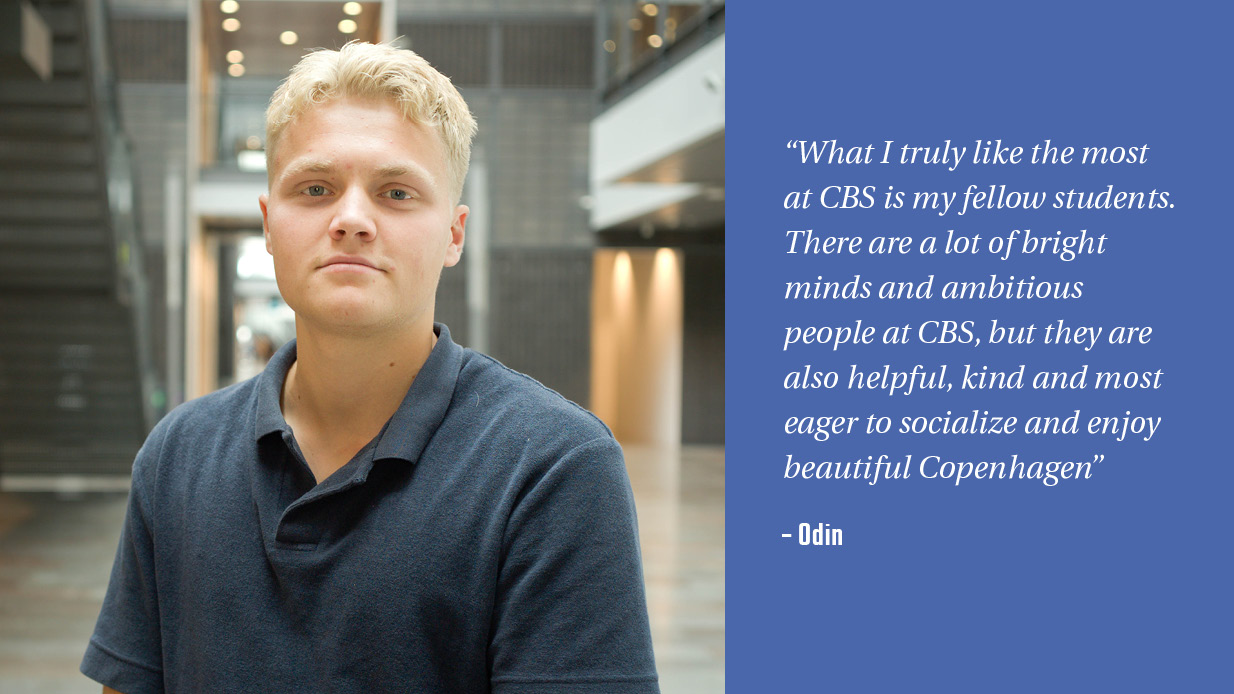Student life
What is it like to study at CBS?
With more than 21,000 students, there is always life on campus. CBS students come from all kind of backgrounds and countries, which means you are joining a vibrant and diverse student life.
There are over 30 different graduate programmes at CBS, all with their own specialisation. This means you have the opportunity to make friends with students from a variety of different programmes, all with different interests, passions, and dreams.
You will meet people everywhere. Students spend a lot of time both socializing but also studying all over campus. You will find your fellow students in the canteen, in the library, at our student café Nexus, or in one of the many cafés located around campus. On a sunny day, you can also be sure to find heaps of students enjoying their time around the outsides of campus.

Experience an international student environment
At CBS, you will find yourself surrounded with students from all over the world. You will discover a diverse campus with thousands of international students with over 50 different nationalities. You will also notice that many of your lecturers and guest professors are international or have international work experience. CBS is a great place to build and expand your international network.
Have you always wanted to experience another part of the world? You are in the right place. To foster the international community, CBS has different opportunities for students to broaden their horizon and meet people from other cultures. Many CBS students go on exchange, but they might also join the International Student Amassadors (ISA), or sign up to be a buddy for exchange students coming to CBS.
Whilst you will be surrounded by many internationals, you will also become familiar with the Danish culture at CBS. Danes are generally very good at English but might require an extra "hi" to open up. Danes tend to be quite informal and are known for being expressive and honest.
It is up to you to decide what kind of international experience you want at CBS. Read more here about creating your international profile

Join a student organisation
Different students have different interests and at CBS, you can be sure to find organisations that fits yours. CBS has more than 100 student organisations which means no matter what your interests are, you will find like minded students.
You like playing paddle? We got you! Interested in Blockchain? We got you! Enjoy watching movies or doing wine tastings? We got you! Interested in hiking? Investments? Sustainability? Art? We got you! And if you have a hobby that is not already represented, you are always welcome to start your own organisation!
And it doesn't stop there. Outside of the many, many student organisations, you will also find other things that you can get involved in. Join student politics, create your own start-up, be a mentor for new students, participate in case competitions, organise study start activities in the intro week. The possibilities are endless.

A collaborative mindset
Working together and collaborating is a big part of being a student at CBS. Some classes include mandatory groupwork, but many decide to form study groups just to help each other anyway. Being a university student can be tough at times, so having a support system of fellow students is a great help.
When you start your graduate programme at CBS, you are likely to notice that some people already might know eachother. This is because many students study both their bachelor and gradaute programme at CBS. Nonetheless, a new programme means new opportunities.
Around campus you will find many people sitting together, studying or just enjoying themselves. Some students find it helpful to talk through the course material with others, while some prefer to sit alone, which you will also find people doing at the library. There is space for everybody. You will have a lot of opportunities to get to know others and create a network at CBS. All it requires from you is to go out there and make it happen.
At CBS, students help students. The general attitude is that students want to do their best and that working together is the best way to get there.

What is the teaching like?
Going from your bachelor to a master can be a big change. Preparing and getting an idea of what to expect helps.
Below, you find the need-to-know about how semesters are structured, how much you should expect to prepare for your classes, and what options you have during your third semester.
All CBS’ graduate programmes are two years and are divided either into semesters or quarters. These will in turn consist of mandatory courses, electives/internship/exchange, and a master's thesis.
Semester structure
In most programmes, the academic year is divided into semesters. Usually, each semester includes four courses which all are completed with an exam. A year has two semesters, a spring and an autumn semester:
- The autumn semester runs from the beginning of September until the the beginning of December with exams in December and January.
- The spring semester runs from the beginning of February until mid May with exams in May and June.
Quarter structure
Some programmes will have a quarter structure and one year consists of four quarters. Usually, a quarter includes two courses each completed with an exam, so you have two exams at the end of the quarter. Each quarter:
- Runs for approximately seven weeks.
- Is completed with exams, that therefore take place four times a year (October/November, December/January, March/April and May/June).
Options during the programme
During your time at CBS, you have some options that allows you to create your own academic profile..
Electives
During the third semester, you can choose to study courses of your specific interest. CBS offers a large number of electives within a wide range of topics in economics, business administration and other related disciplines. The electives you choose need to be relevant for your programme and you can have a look at the current selection of at CBS electives here. You can also choose to take electives at another Danish university.
Exchange
You can also choose to go abroad during your third semester. A lot of students choose to go on exchange, and they usually do so through one of CBS’ many international collaboration agreements. When you go on exchange through CBS, you do not have to pay tuition fee at the foreign university (with a few exceptions). Find a list of all our partner universities here.
Academic internship
In some programmes, you can substitute some of your electives with a so-called academic internship. You can choose to do theinternship anywhere in the world. The academic internship consists of a working period in a company which is completed with a project report and an exam. The project should be relevant in regards to your study programme.
Thesis
The second year is finalised with writing your thesis. You write the thesis either alone or with a partner, and you chose the topic you want to write about. This allows you to focus on a topic of your interest.
Teaching and working methods
Time consumption
The CBS’ graduate programmes are full-time programmes which means that you should expect spending approximately 37 hours on average on your studies each week. The workload will vary during the semester/quarter and the year. The time leading up to assignment submissions and exams can be hectic, and you can easily work more than 40 hours a week in this period.
Note that CBS also offers corporate part-time masters.
Hours of teaching
You will experience many different forms of teaching at CBS. The most common are:
- Lectures: usually, a lecturer will review the readings from syllabus and put them into perspective in front of the whole class. Most students take a lot of notes during the lectures.
- Exercises: are often scheduled in continuation of lectures with smaller groups of approximately 30-40 students with a lot of dialogue between the lecture and the students. You often do some exercises based on what has been reviewed during the lecture.
There are approximately 12-14 teaching hours a week scheduled in the daytime Monday through Friday.
The remaining time is spent on individual preparation, voluntary and mandatory group work, papers (often written with a fellow student) and exams.
Individual preparation
You are expected to prepare for each class. This will usually take the form of a number of readings, such as academic papers or textbooks.
Group work
All programmes include assignments and varying degrees of preparation which should be done in groups – in connection with teaching activities and exams. Many students also choose to form study groups where they meet and discuss the syllabus, write assignments and together prepare for the teaching activities or the exam.
Exams and exam types
At CBS, each course is completed with an exam. In some programmes, there might also be minor exams during the course.
Assessment
You are only assessed at the exam. Your grade is neither affected by attendance nor how active you are during class.
The exam assessment is usually based on the 7-point grading scale. Some exams are however assessed on a pass/fail basis. The final grade is definite, which means that your fellow students’ exam efforts do not have any implications for your grade. The assessment of your performance is solely based on how well you meet the academic requirements specified for the relevant exam.
Types of examinations
You can experience many different types of examinations which also vary from programme to programme.
Written exams can be:
- Projects: where you work with a theoretical problem statement or a case based on practice - either individually or in groups
- Shorter written exams: where you are given an assignment you have to answer within a limited time period e.g. 24, 48 or 72 hour exam assignments.
- Sit-in exams: where you meet up at CBS and do a written exam typically in 4 hours - with or without exam aids.
Oral exams can be:
- A presentation of a given topic
- A syllabus exam where you will draw a question or topic to discuss
- Oral defence of a written paper
Before applying for a programme taught in English you might want to consider the following:
- All literature, lectures, exams, projects and group work are in English
- Academic English differs from the English used in everyday language – so it might be a challenge even if you are used to speaking English in other situations.
- You may have to spend more time on reading and understanding the material in English
- You may find it challenging to express yourself with the same ease as you would in your mother tongue.
- Some will feel uncomfortable and shy when speaking English – especially when in a crowd or among native speakers.
Practice makes perfect
There is a big difference between reading and understanding texts and expressing yourself in English both orally and in writing. This is a challenge for some students. Even if you are used to reading English texts on your bachelor programme, it is still a good idea to practice your English. Try to speak it on a regular basis, watch the news, movies and TV series in English. You should also read books and newspapers in English, as this will help you read faster and increase your vocabulary. A good command of English is essential for getting the maximum learning outcome of your programme.
Hear a student guidance counsellor explain what it is like to study a graduate programme taught in English
As the number of lectures and exercises is not that high, students find the concentration to be quite flexible for combining studies with a student job. However, the workload is still full time, so prioritising and managing your time will be essential to be able to cover the curriculum in time for exams.
It is not uncommon for students to underestimate the time it actually takes to really understand how to use the theories and tools to the extent where you can explain and discuss them at an oral exam. Finding the right study technique can be challenging and requires good time management skills. Especially if you also have a student job .